Management & Operations Report: M&S Leadership and Management
VerifiedAdded on 2023/01/23
|12
|3868
|51
Report
AI Summary
This report provides a comprehensive analysis of management and operations, focusing on the British multinational retailer, Marks & Spencer (M&S). It explores the roles of leaders and managers in addressing organizational challenges such as staff retention, interpersonal conflicts, and task allocation. The report examines various leadership theories, including contingency, situational, and system leadership, and their application within M&S. Furthermore, it delves into operational management approaches such as Just-in-Time (JIT) and Total Quality Management (TQM), highlighting their benefits for improving efficiency and product quality. The study also considers the impact of external environmental factors on decision-making processes within the company. Overall, the report offers valuable insights into the strategies and practices employed by M&S to achieve its organizational goals.
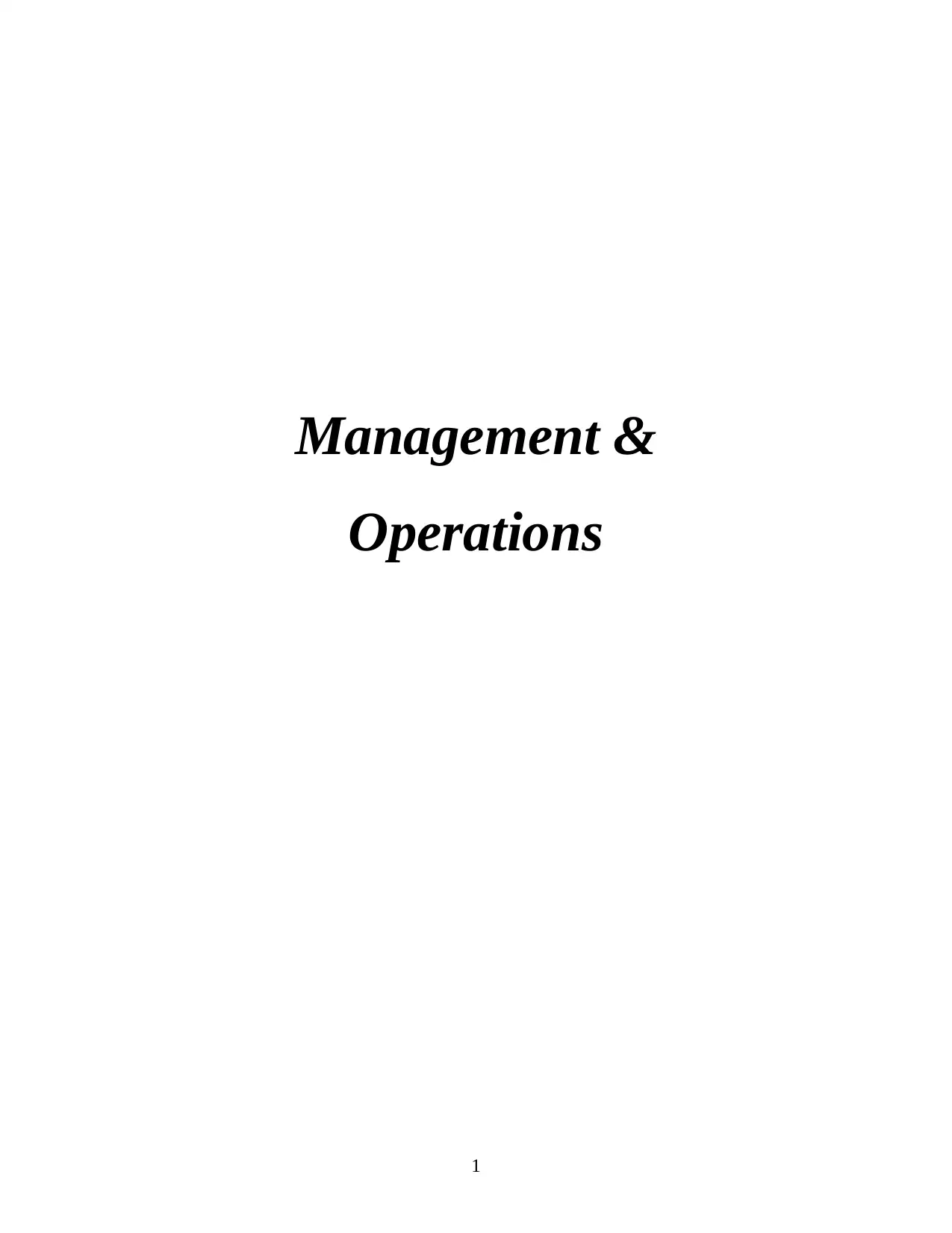
Management &
Operations
1
Operations
1
Paraphrase This Document
Need a fresh take? Get an instant paraphrase of this document with our AI Paraphraser
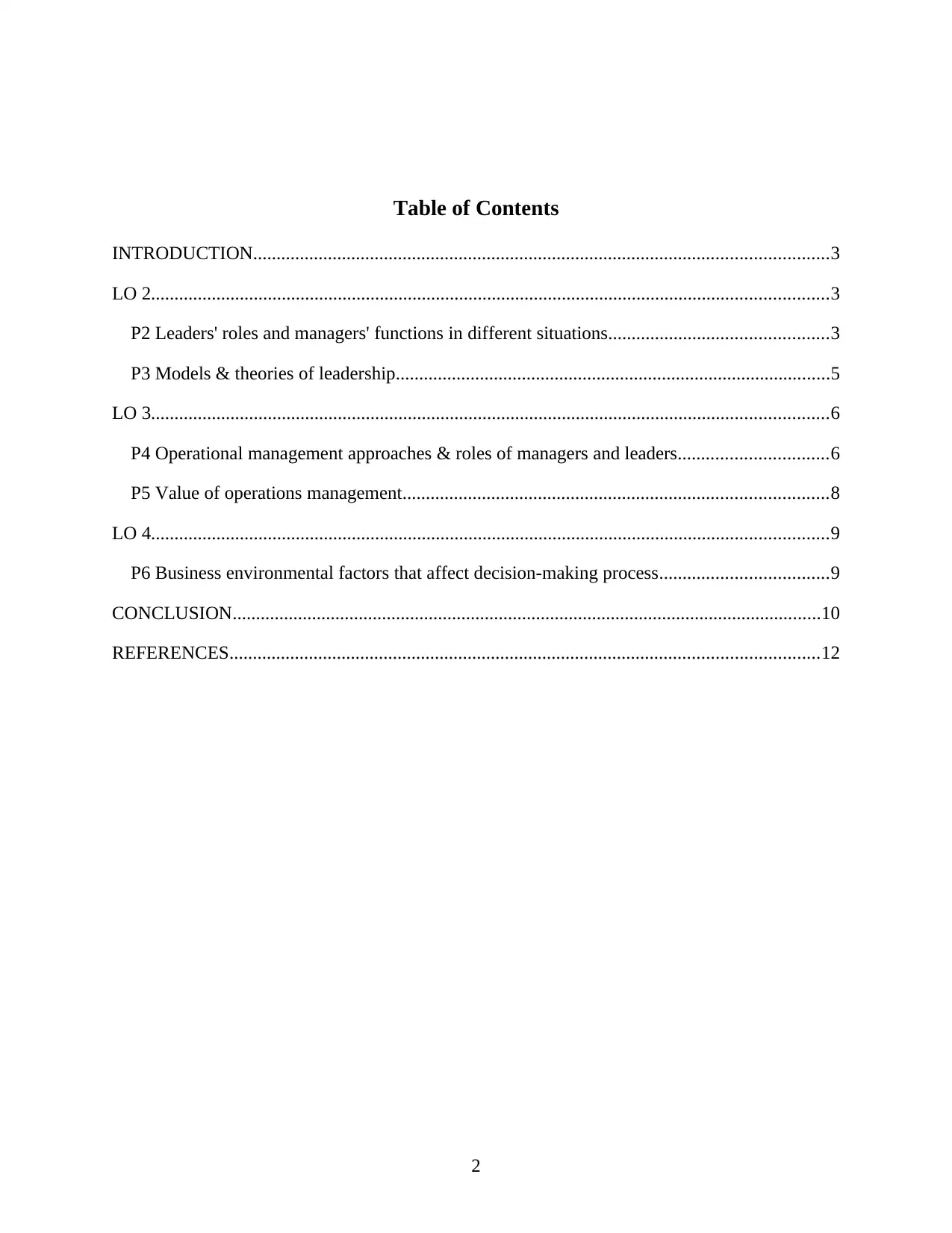
Table of Contents
INTRODUCTION...........................................................................................................................3
LO 2.................................................................................................................................................3
P2 Leaders' roles and managers' functions in different situations...............................................3
P3 Models & theories of leadership.............................................................................................5
LO 3.................................................................................................................................................6
P4 Operational management approaches & roles of managers and leaders................................6
P5 Value of operations management...........................................................................................8
LO 4.................................................................................................................................................9
P6 Business environmental factors that affect decision-making process....................................9
CONCLUSION..............................................................................................................................10
REFERENCES..............................................................................................................................12
2
INTRODUCTION...........................................................................................................................3
LO 2.................................................................................................................................................3
P2 Leaders' roles and managers' functions in different situations...............................................3
P3 Models & theories of leadership.............................................................................................5
LO 3.................................................................................................................................................6
P4 Operational management approaches & roles of managers and leaders................................6
P5 Value of operations management...........................................................................................8
LO 4.................................................................................................................................................9
P6 Business environmental factors that affect decision-making process....................................9
CONCLUSION..............................................................................................................................10
REFERENCES..............................................................................................................................12
2
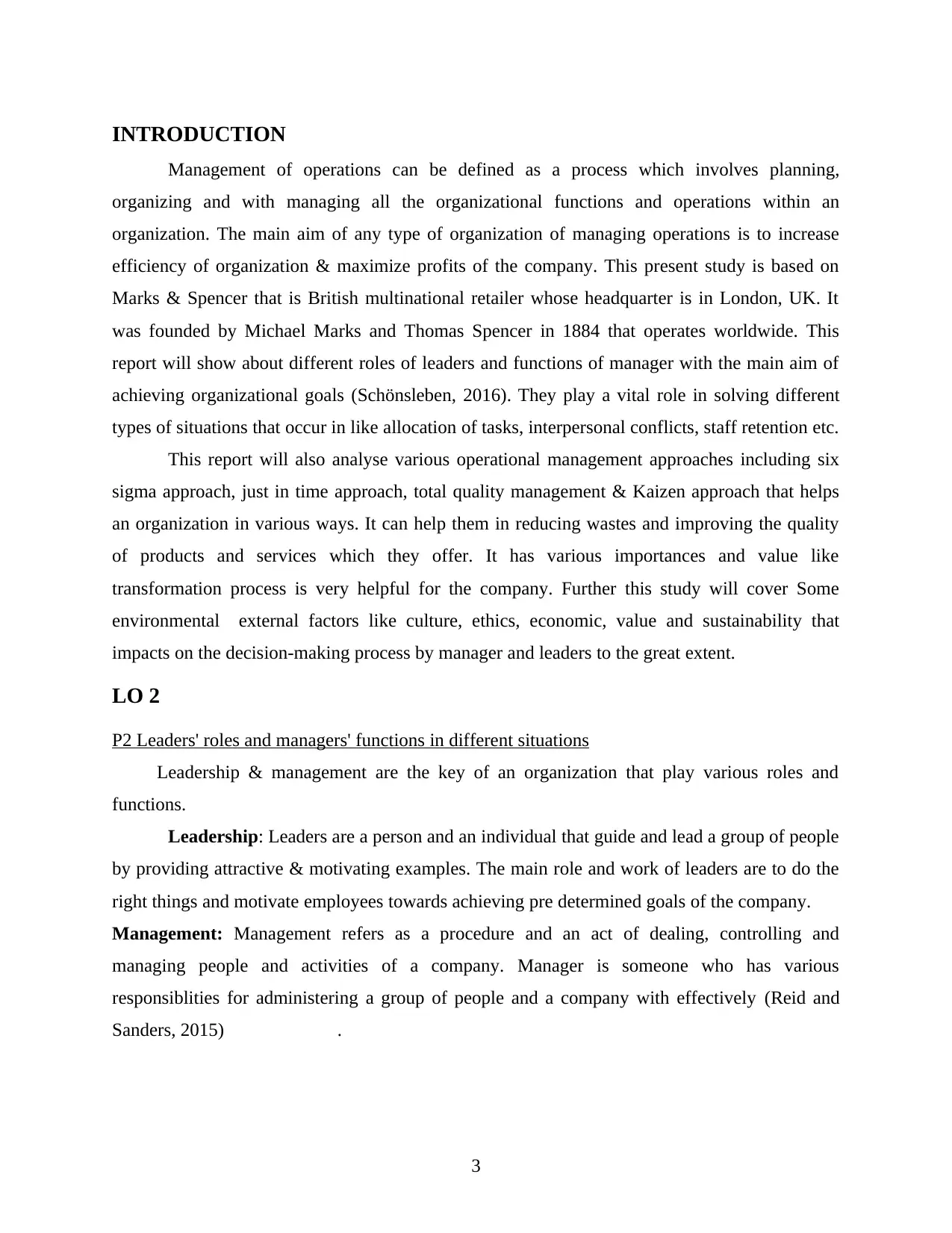
INTRODUCTION
Management of operations can be defined as a process which involves planning,
organizing and with managing all the organizational functions and operations within an
organization. The main aim of any type of organization of managing operations is to increase
efficiency of organization & maximize profits of the company. This present study is based on
Marks & Spencer that is British multinational retailer whose headquarter is in London, UK. It
was founded by Michael Marks and Thomas Spencer in 1884 that operates worldwide. This
report will show about different roles of leaders and functions of manager with the main aim of
achieving organizational goals (Schönsleben, 2016). They play a vital role in solving different
types of situations that occur in like allocation of tasks, interpersonal conflicts, staff retention etc.
This report will also analyse various operational management approaches including six
sigma approach, just in time approach, total quality management & Kaizen approach that helps
an organization in various ways. It can help them in reducing wastes and improving the quality
of products and services which they offer. It has various importances and value like
transformation process is very helpful for the company. Further this study will cover Some
environmental external factors like culture, ethics, economic, value and sustainability that
impacts on the decision-making process by manager and leaders to the great extent.
LO 2
P2 Leaders' roles and managers' functions in different situations
Leadership & management are the key of an organization that play various roles and
functions.
Leadership: Leaders are a person and an individual that guide and lead a group of people
by providing attractive & motivating examples. The main role and work of leaders are to do the
right things and motivate employees towards achieving pre determined goals of the company.
Management: Management refers as a procedure and an act of dealing, controlling and
managing people and activities of a company. Manager is someone who has various
responsiblities for administering a group of people and a company with effectively (Reid and
Sanders, 2015) .
3
Management of operations can be defined as a process which involves planning,
organizing and with managing all the organizational functions and operations within an
organization. The main aim of any type of organization of managing operations is to increase
efficiency of organization & maximize profits of the company. This present study is based on
Marks & Spencer that is British multinational retailer whose headquarter is in London, UK. It
was founded by Michael Marks and Thomas Spencer in 1884 that operates worldwide. This
report will show about different roles of leaders and functions of manager with the main aim of
achieving organizational goals (Schönsleben, 2016). They play a vital role in solving different
types of situations that occur in like allocation of tasks, interpersonal conflicts, staff retention etc.
This report will also analyse various operational management approaches including six
sigma approach, just in time approach, total quality management & Kaizen approach that helps
an organization in various ways. It can help them in reducing wastes and improving the quality
of products and services which they offer. It has various importances and value like
transformation process is very helpful for the company. Further this study will cover Some
environmental external factors like culture, ethics, economic, value and sustainability that
impacts on the decision-making process by manager and leaders to the great extent.
LO 2
P2 Leaders' roles and managers' functions in different situations
Leadership & management are the key of an organization that play various roles and
functions.
Leadership: Leaders are a person and an individual that guide and lead a group of people
by providing attractive & motivating examples. The main role and work of leaders are to do the
right things and motivate employees towards achieving pre determined goals of the company.
Management: Management refers as a procedure and an act of dealing, controlling and
managing people and activities of a company. Manager is someone who has various
responsiblities for administering a group of people and a company with effectively (Reid and
Sanders, 2015) .
3
⊘ This is a preview!⊘
Do you want full access?
Subscribe today to unlock all pages.

Trusted by 1+ million students worldwide
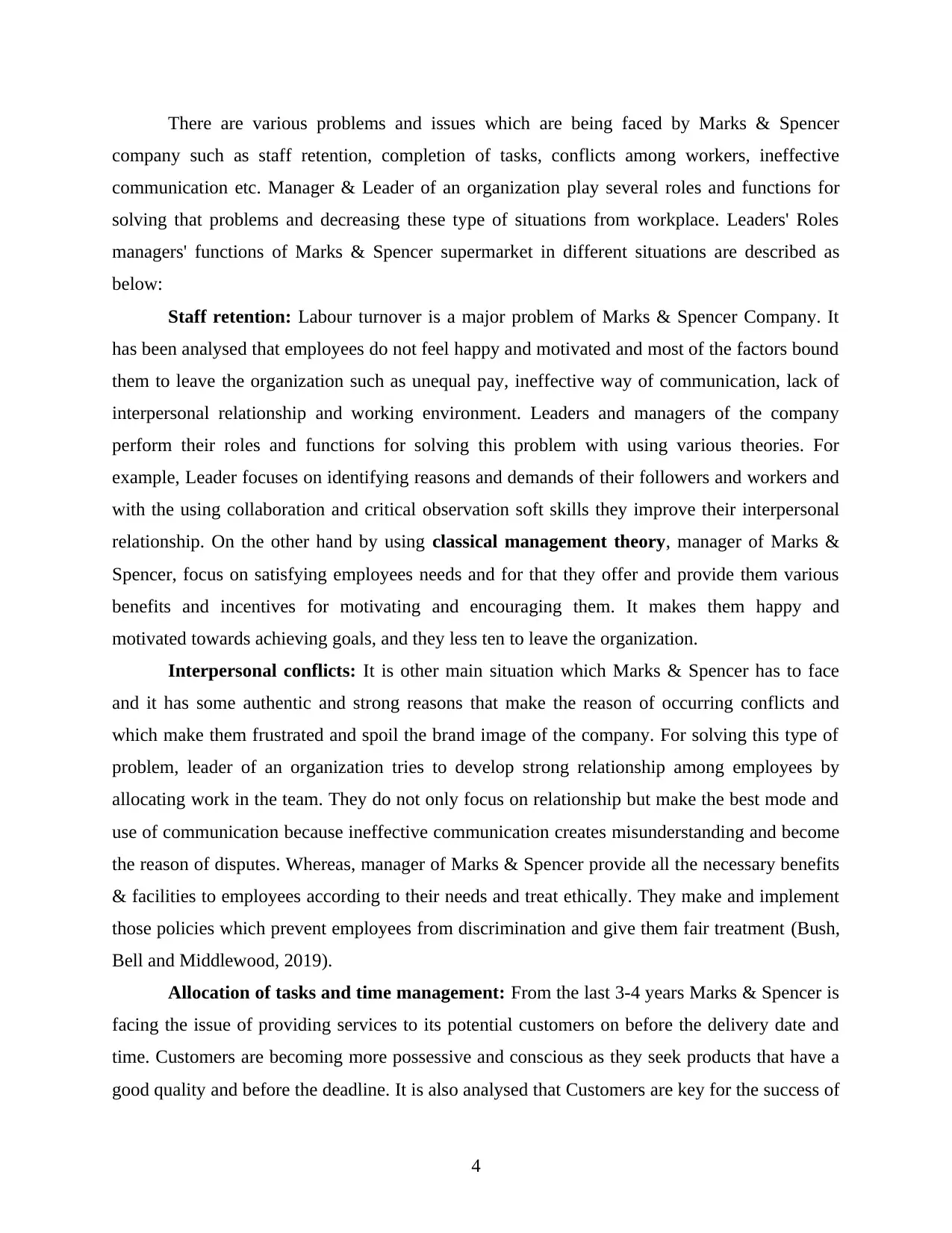
There are various problems and issues which are being faced by Marks & Spencer
company such as staff retention, completion of tasks, conflicts among workers, ineffective
communication etc. Manager & Leader of an organization play several roles and functions for
solving that problems and decreasing these type of situations from workplace. Leaders' Roles
managers' functions of Marks & Spencer supermarket in different situations are described as
below:
Staff retention: Labour turnover is a major problem of Marks & Spencer Company. It
has been analysed that employees do not feel happy and motivated and most of the factors bound
them to leave the organization such as unequal pay, ineffective way of communication, lack of
interpersonal relationship and working environment. Leaders and managers of the company
perform their roles and functions for solving this problem with using various theories. For
example, Leader focuses on identifying reasons and demands of their followers and workers and
with the using collaboration and critical observation soft skills they improve their interpersonal
relationship. On the other hand by using classical management theory, manager of Marks &
Spencer, focus on satisfying employees needs and for that they offer and provide them various
benefits and incentives for motivating and encouraging them. It makes them happy and
motivated towards achieving goals, and they less ten to leave the organization.
Interpersonal conflicts: It is other main situation which Marks & Spencer has to face
and it has some authentic and strong reasons that make the reason of occurring conflicts and
which make them frustrated and spoil the brand image of the company. For solving this type of
problem, leader of an organization tries to develop strong relationship among employees by
allocating work in the team. They do not only focus on relationship but make the best mode and
use of communication because ineffective communication creates misunderstanding and become
the reason of disputes. Whereas, manager of Marks & Spencer provide all the necessary benefits
& facilities to employees according to their needs and treat ethically. They make and implement
those policies which prevent employees from discrimination and give them fair treatment (Bush,
Bell and Middlewood, 2019).
Allocation of tasks and time management: From the last 3-4 years Marks & Spencer is
facing the issue of providing services to its potential customers on before the delivery date and
time. Customers are becoming more possessive and conscious as they seek products that have a
good quality and before the deadline. It is also analysed that Customers are key for the success of
4
company such as staff retention, completion of tasks, conflicts among workers, ineffective
communication etc. Manager & Leader of an organization play several roles and functions for
solving that problems and decreasing these type of situations from workplace. Leaders' Roles
managers' functions of Marks & Spencer supermarket in different situations are described as
below:
Staff retention: Labour turnover is a major problem of Marks & Spencer Company. It
has been analysed that employees do not feel happy and motivated and most of the factors bound
them to leave the organization such as unequal pay, ineffective way of communication, lack of
interpersonal relationship and working environment. Leaders and managers of the company
perform their roles and functions for solving this problem with using various theories. For
example, Leader focuses on identifying reasons and demands of their followers and workers and
with the using collaboration and critical observation soft skills they improve their interpersonal
relationship. On the other hand by using classical management theory, manager of Marks &
Spencer, focus on satisfying employees needs and for that they offer and provide them various
benefits and incentives for motivating and encouraging them. It makes them happy and
motivated towards achieving goals, and they less ten to leave the organization.
Interpersonal conflicts: It is other main situation which Marks & Spencer has to face
and it has some authentic and strong reasons that make the reason of occurring conflicts and
which make them frustrated and spoil the brand image of the company. For solving this type of
problem, leader of an organization tries to develop strong relationship among employees by
allocating work in the team. They do not only focus on relationship but make the best mode and
use of communication because ineffective communication creates misunderstanding and become
the reason of disputes. Whereas, manager of Marks & Spencer provide all the necessary benefits
& facilities to employees according to their needs and treat ethically. They make and implement
those policies which prevent employees from discrimination and give them fair treatment (Bush,
Bell and Middlewood, 2019).
Allocation of tasks and time management: From the last 3-4 years Marks & Spencer is
facing the issue of providing services to its potential customers on before the delivery date and
time. Customers are becoming more possessive and conscious as they seek products that have a
good quality and before the deadline. It is also analysed that Customers are key for the success of
4
Paraphrase This Document
Need a fresh take? Get an instant paraphrase of this document with our AI Paraphraser
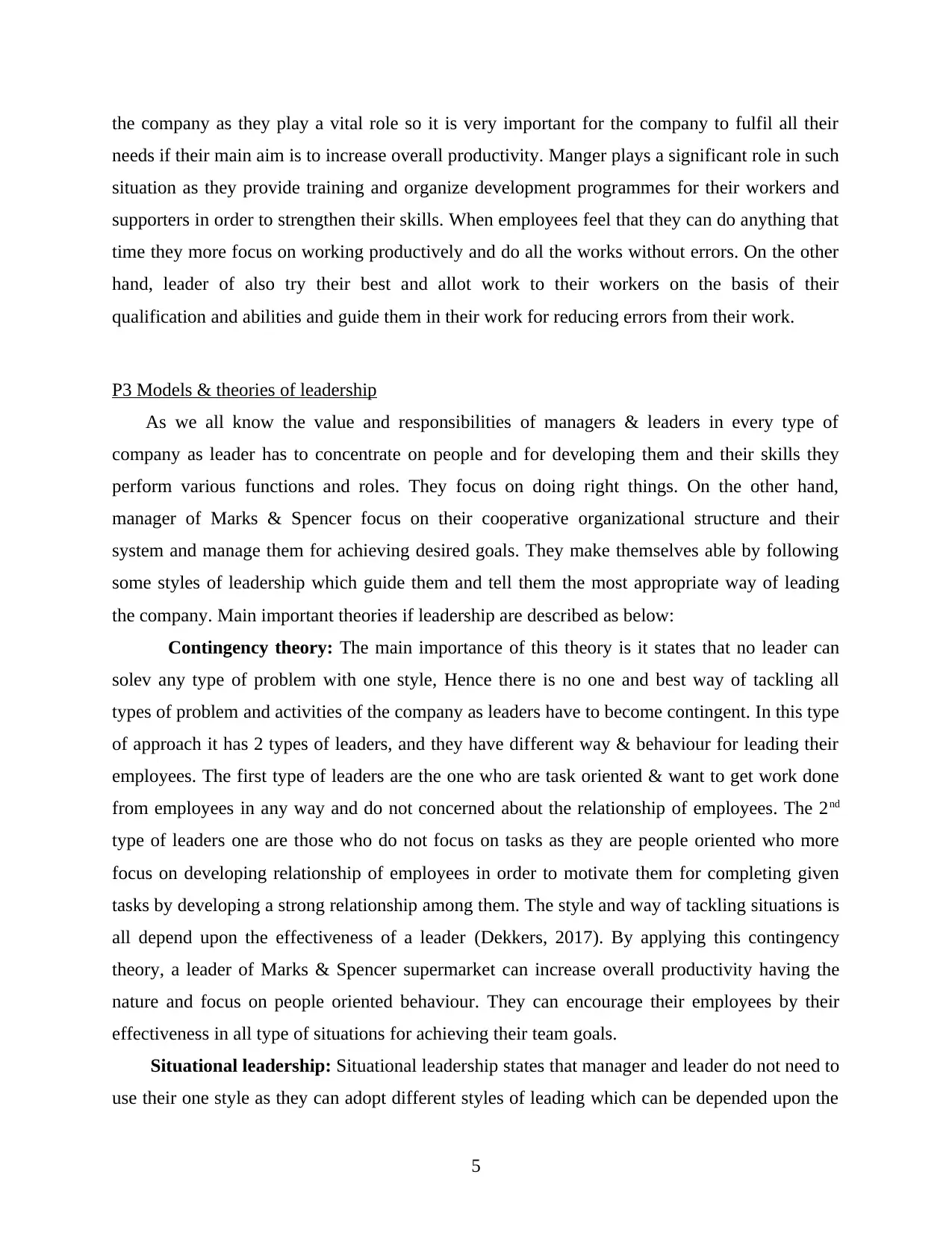
the company as they play a vital role so it is very important for the company to fulfil all their
needs if their main aim is to increase overall productivity. Manger plays a significant role in such
situation as they provide training and organize development programmes for their workers and
supporters in order to strengthen their skills. When employees feel that they can do anything that
time they more focus on working productively and do all the works without errors. On the other
hand, leader of also try their best and allot work to their workers on the basis of their
qualification and abilities and guide them in their work for reducing errors from their work.
P3 Models & theories of leadership
As we all know the value and responsibilities of managers & leaders in every type of
company as leader has to concentrate on people and for developing them and their skills they
perform various functions and roles. They focus on doing right things. On the other hand,
manager of Marks & Spencer focus on their cooperative organizational structure and their
system and manage them for achieving desired goals. They make themselves able by following
some styles of leadership which guide them and tell them the most appropriate way of leading
the company. Main important theories if leadership are described as below:
Contingency theory: The main importance of this theory is it states that no leader can
solev any type of problem with one style, Hence there is no one and best way of tackling all
types of problem and activities of the company as leaders have to become contingent. In this type
of approach it has 2 types of leaders, and they have different way & behaviour for leading their
employees. The first type of leaders are the one who are task oriented & want to get work done
from employees in any way and do not concerned about the relationship of employees. The 2nd
type of leaders one are those who do not focus on tasks as they are people oriented who more
focus on developing relationship of employees in order to motivate them for completing given
tasks by developing a strong relationship among them. The style and way of tackling situations is
all depend upon the effectiveness of a leader (Dekkers, 2017). By applying this contingency
theory, a leader of Marks & Spencer supermarket can increase overall productivity having the
nature and focus on people oriented behaviour. They can encourage their employees by their
effectiveness in all type of situations for achieving their team goals.
Situational leadership: Situational leadership states that manager and leader do not need to
use their one style as they can adopt different styles of leading which can be depended upon the
5
needs if their main aim is to increase overall productivity. Manger plays a significant role in such
situation as they provide training and organize development programmes for their workers and
supporters in order to strengthen their skills. When employees feel that they can do anything that
time they more focus on working productively and do all the works without errors. On the other
hand, leader of also try their best and allot work to their workers on the basis of their
qualification and abilities and guide them in their work for reducing errors from their work.
P3 Models & theories of leadership
As we all know the value and responsibilities of managers & leaders in every type of
company as leader has to concentrate on people and for developing them and their skills they
perform various functions and roles. They focus on doing right things. On the other hand,
manager of Marks & Spencer focus on their cooperative organizational structure and their
system and manage them for achieving desired goals. They make themselves able by following
some styles of leadership which guide them and tell them the most appropriate way of leading
the company. Main important theories if leadership are described as below:
Contingency theory: The main importance of this theory is it states that no leader can
solev any type of problem with one style, Hence there is no one and best way of tackling all
types of problem and activities of the company as leaders have to become contingent. In this type
of approach it has 2 types of leaders, and they have different way & behaviour for leading their
employees. The first type of leaders are the one who are task oriented & want to get work done
from employees in any way and do not concerned about the relationship of employees. The 2nd
type of leaders one are those who do not focus on tasks as they are people oriented who more
focus on developing relationship of employees in order to motivate them for completing given
tasks by developing a strong relationship among them. The style and way of tackling situations is
all depend upon the effectiveness of a leader (Dekkers, 2017). By applying this contingency
theory, a leader of Marks & Spencer supermarket can increase overall productivity having the
nature and focus on people oriented behaviour. They can encourage their employees by their
effectiveness in all type of situations for achieving their team goals.
Situational leadership: Situational leadership states that manager and leader do not need to
use their one style as they can adopt different styles of leading which can be depended upon the
5
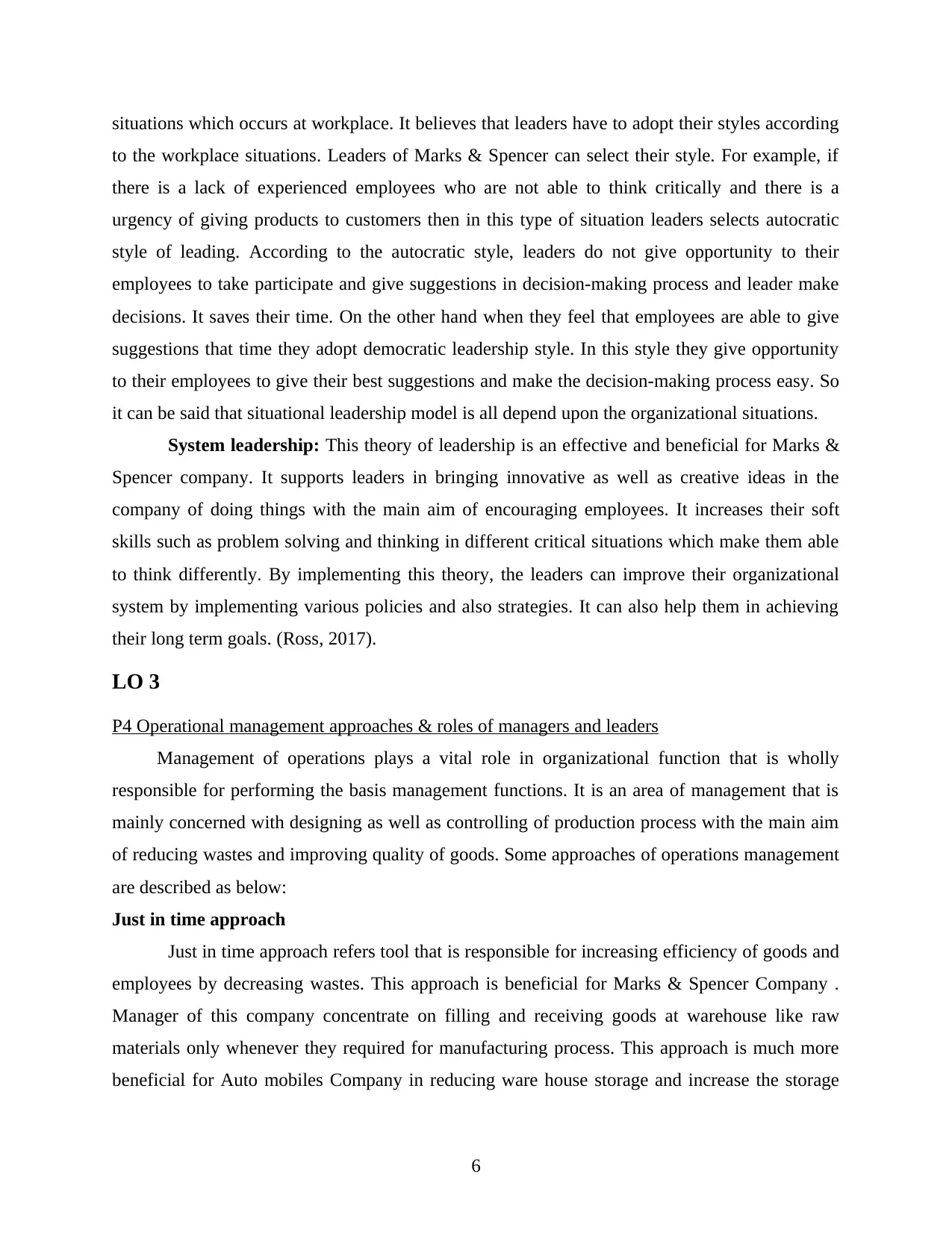
situations which occurs at workplace. It believes that leaders have to adopt their styles according
to the workplace situations. Leaders of Marks & Spencer can select their style. For example, if
there is a lack of experienced employees who are not able to think critically and there is a
urgency of giving products to customers then in this type of situation leaders selects autocratic
style of leading. According to the autocratic style, leaders do not give opportunity to their
employees to take participate and give suggestions in decision-making process and leader make
decisions. It saves their time. On the other hand when they feel that employees are able to give
suggestions that time they adopt democratic leadership style. In this style they give opportunity
to their employees to give their best suggestions and make the decision-making process easy. So
it can be said that situational leadership model is all depend upon the organizational situations.
System leadership: This theory of leadership is an effective and beneficial for Marks &
Spencer company. It supports leaders in bringing innovative as well as creative ideas in the
company of doing things with the main aim of encouraging employees. It increases their soft
skills such as problem solving and thinking in different critical situations which make them able
to think differently. By implementing this theory, the leaders can improve their organizational
system by implementing various policies and also strategies. It can also help them in achieving
their long term goals. (Ross, 2017).
LO 3
P4 Operational management approaches & roles of managers and leaders
Management of operations plays a vital role in organizational function that is wholly
responsible for performing the basis management functions. It is an area of management that is
mainly concerned with designing as well as controlling of production process with the main aim
of reducing wastes and improving quality of goods. Some approaches of operations management
are described as below:
Just in time approach
Just in time approach refers tool that is responsible for increasing efficiency of goods and
employees by decreasing wastes. This approach is beneficial for Marks & Spencer Company .
Manager of this company concentrate on filling and receiving goods at warehouse like raw
materials only whenever they required for manufacturing process. This approach is much more
beneficial for Auto mobiles Company in reducing ware house storage and increase the storage
6
to the workplace situations. Leaders of Marks & Spencer can select their style. For example, if
there is a lack of experienced employees who are not able to think critically and there is a
urgency of giving products to customers then in this type of situation leaders selects autocratic
style of leading. According to the autocratic style, leaders do not give opportunity to their
employees to take participate and give suggestions in decision-making process and leader make
decisions. It saves their time. On the other hand when they feel that employees are able to give
suggestions that time they adopt democratic leadership style. In this style they give opportunity
to their employees to give their best suggestions and make the decision-making process easy. So
it can be said that situational leadership model is all depend upon the organizational situations.
System leadership: This theory of leadership is an effective and beneficial for Marks &
Spencer company. It supports leaders in bringing innovative as well as creative ideas in the
company of doing things with the main aim of encouraging employees. It increases their soft
skills such as problem solving and thinking in different critical situations which make them able
to think differently. By implementing this theory, the leaders can improve their organizational
system by implementing various policies and also strategies. It can also help them in achieving
their long term goals. (Ross, 2017).
LO 3
P4 Operational management approaches & roles of managers and leaders
Management of operations plays a vital role in organizational function that is wholly
responsible for performing the basis management functions. It is an area of management that is
mainly concerned with designing as well as controlling of production process with the main aim
of reducing wastes and improving quality of goods. Some approaches of operations management
are described as below:
Just in time approach
Just in time approach refers tool that is responsible for increasing efficiency of goods and
employees by decreasing wastes. This approach is beneficial for Marks & Spencer Company .
Manager of this company concentrate on filling and receiving goods at warehouse like raw
materials only whenever they required for manufacturing process. This approach is much more
beneficial for Auto mobiles Company in reducing ware house storage and increase the storage
6
⊘ This is a preview!⊘
Do you want full access?
Subscribe today to unlock all pages.

Trusted by 1+ million students worldwide
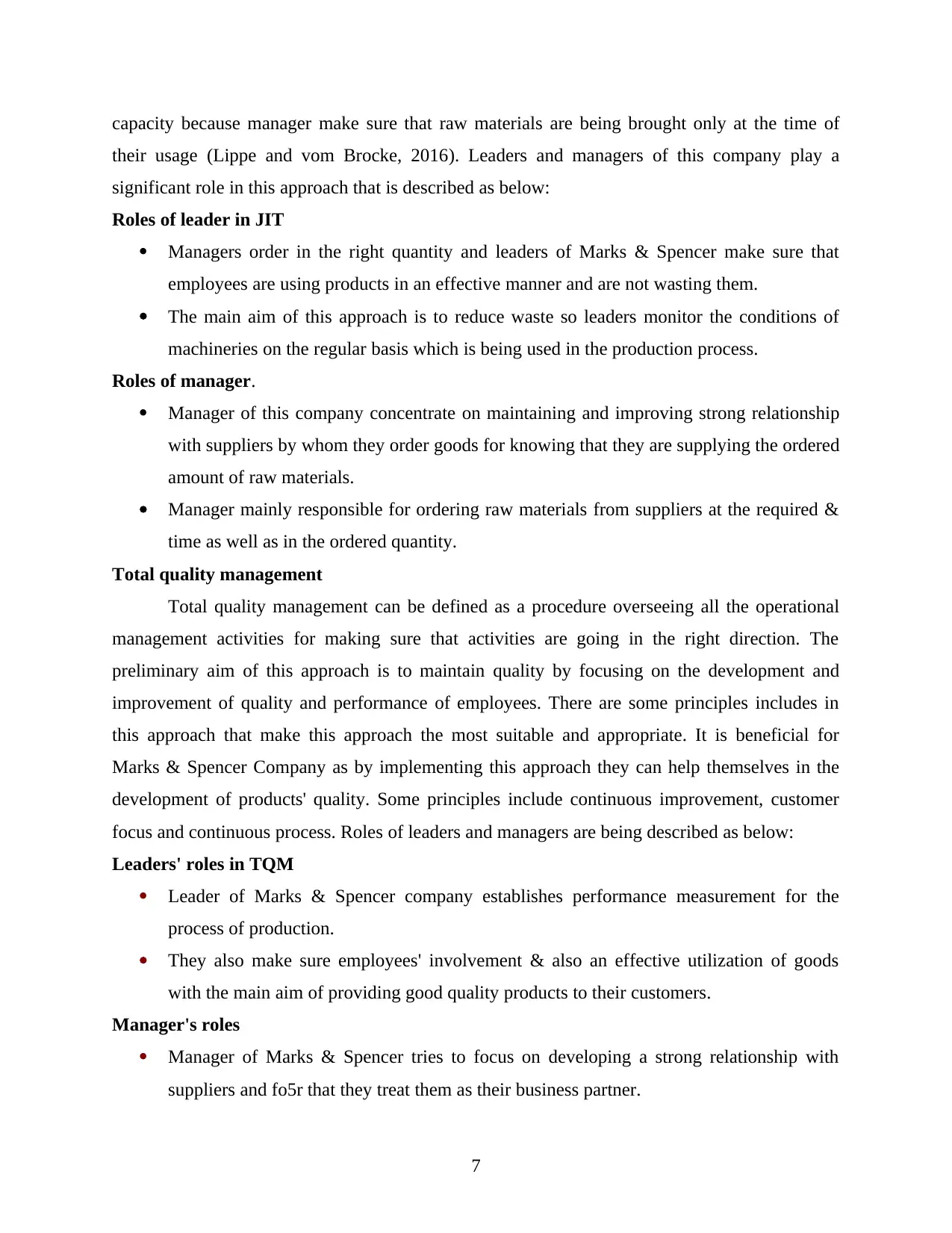
capacity because manager make sure that raw materials are being brought only at the time of
their usage (Lippe and vom Brocke, 2016). Leaders and managers of this company play a
significant role in this approach that is described as below:
Roles of leader in JIT
Managers order in the right quantity and leaders of Marks & Spencer make sure that
employees are using products in an effective manner and are not wasting them.
The main aim of this approach is to reduce waste so leaders monitor the conditions of
machineries on the regular basis which is being used in the production process.
Roles of manager.
Manager of this company concentrate on maintaining and improving strong relationship
with suppliers by whom they order goods for knowing that they are supplying the ordered
amount of raw materials.
Manager mainly responsible for ordering raw materials from suppliers at the required &
time as well as in the ordered quantity.
Total quality management
Total quality management can be defined as a procedure overseeing all the operational
management activities for making sure that activities are going in the right direction. The
preliminary aim of this approach is to maintain quality by focusing on the development and
improvement of quality and performance of employees. There are some principles includes in
this approach that make this approach the most suitable and appropriate. It is beneficial for
Marks & Spencer Company as by implementing this approach they can help themselves in the
development of products' quality. Some principles include continuous improvement, customer
focus and continuous process. Roles of leaders and managers are being described as below:
Leaders' roles in TQM
Leader of Marks & Spencer company establishes performance measurement for the
process of production.
They also make sure employees' involvement & also an effective utilization of goods
with the main aim of providing good quality products to their customers.
Manager's roles
Manager of Marks & Spencer tries to focus on developing a strong relationship with
suppliers and fo5r that they treat them as their business partner.
7
their usage (Lippe and vom Brocke, 2016). Leaders and managers of this company play a
significant role in this approach that is described as below:
Roles of leader in JIT
Managers order in the right quantity and leaders of Marks & Spencer make sure that
employees are using products in an effective manner and are not wasting them.
The main aim of this approach is to reduce waste so leaders monitor the conditions of
machineries on the regular basis which is being used in the production process.
Roles of manager.
Manager of this company concentrate on maintaining and improving strong relationship
with suppliers by whom they order goods for knowing that they are supplying the ordered
amount of raw materials.
Manager mainly responsible for ordering raw materials from suppliers at the required &
time as well as in the ordered quantity.
Total quality management
Total quality management can be defined as a procedure overseeing all the operational
management activities for making sure that activities are going in the right direction. The
preliminary aim of this approach is to maintain quality by focusing on the development and
improvement of quality and performance of employees. There are some principles includes in
this approach that make this approach the most suitable and appropriate. It is beneficial for
Marks & Spencer Company as by implementing this approach they can help themselves in the
development of products' quality. Some principles include continuous improvement, customer
focus and continuous process. Roles of leaders and managers are being described as below:
Leaders' roles in TQM
Leader of Marks & Spencer company establishes performance measurement for the
process of production.
They also make sure employees' involvement & also an effective utilization of goods
with the main aim of providing good quality products to their customers.
Manager's roles
Manager of Marks & Spencer tries to focus on developing a strong relationship with
suppliers and fo5r that they treat them as their business partner.
7
Paraphrase This Document
Need a fresh take? Get an instant paraphrase of this document with our AI Paraphraser
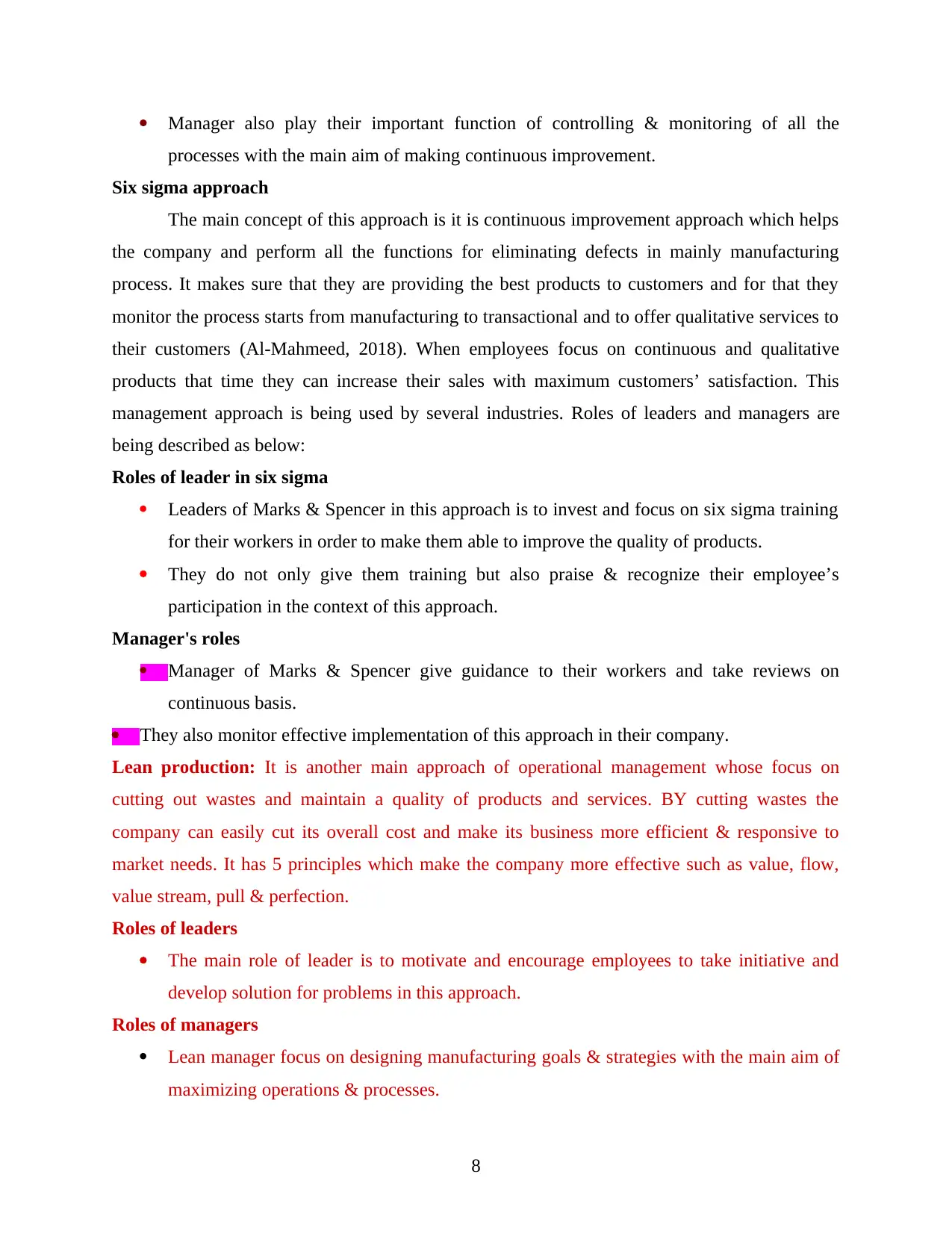
Manager also play their important function of controlling & monitoring of all the
processes with the main aim of making continuous improvement.
Six sigma approach
The main concept of this approach is it is continuous improvement approach which helps
the company and perform all the functions for eliminating defects in mainly manufacturing
process. It makes sure that they are providing the best products to customers and for that they
monitor the process starts from manufacturing to transactional and to offer qualitative services to
their customers (Al-Mahmeed, 2018). When employees focus on continuous and qualitative
products that time they can increase their sales with maximum customers’ satisfaction. This
management approach is being used by several industries. Roles of leaders and managers are
being described as below:
Roles of leader in six sigma
Leaders of Marks & Spencer in this approach is to invest and focus on six sigma training
for their workers in order to make them able to improve the quality of products.
They do not only give them training but also praise & recognize their employee’s
participation in the context of this approach.
Manager's roles
Manager of Marks & Spencer give guidance to their workers and take reviews on
continuous basis.
They also monitor effective implementation of this approach in their company.
Lean production: It is another main approach of operational management whose focus on
cutting out wastes and maintain a quality of products and services. BY cutting wastes the
company can easily cut its overall cost and make its business more efficient & responsive to
market needs. It has 5 principles which make the company more effective such as value, flow,
value stream, pull & perfection.
Roles of leaders
The main role of leader is to motivate and encourage employees to take initiative and
develop solution for problems in this approach.
Roles of managers
Lean manager focus on designing manufacturing goals & strategies with the main aim of
maximizing operations & processes.
8
processes with the main aim of making continuous improvement.
Six sigma approach
The main concept of this approach is it is continuous improvement approach which helps
the company and perform all the functions for eliminating defects in mainly manufacturing
process. It makes sure that they are providing the best products to customers and for that they
monitor the process starts from manufacturing to transactional and to offer qualitative services to
their customers (Al-Mahmeed, 2018). When employees focus on continuous and qualitative
products that time they can increase their sales with maximum customers’ satisfaction. This
management approach is being used by several industries. Roles of leaders and managers are
being described as below:
Roles of leader in six sigma
Leaders of Marks & Spencer in this approach is to invest and focus on six sigma training
for their workers in order to make them able to improve the quality of products.
They do not only give them training but also praise & recognize their employee’s
participation in the context of this approach.
Manager's roles
Manager of Marks & Spencer give guidance to their workers and take reviews on
continuous basis.
They also monitor effective implementation of this approach in their company.
Lean production: It is another main approach of operational management whose focus on
cutting out wastes and maintain a quality of products and services. BY cutting wastes the
company can easily cut its overall cost and make its business more efficient & responsive to
market needs. It has 5 principles which make the company more effective such as value, flow,
value stream, pull & perfection.
Roles of leaders
The main role of leader is to motivate and encourage employees to take initiative and
develop solution for problems in this approach.
Roles of managers
Lean manager focus on designing manufacturing goals & strategies with the main aim of
maximizing operations & processes.
8
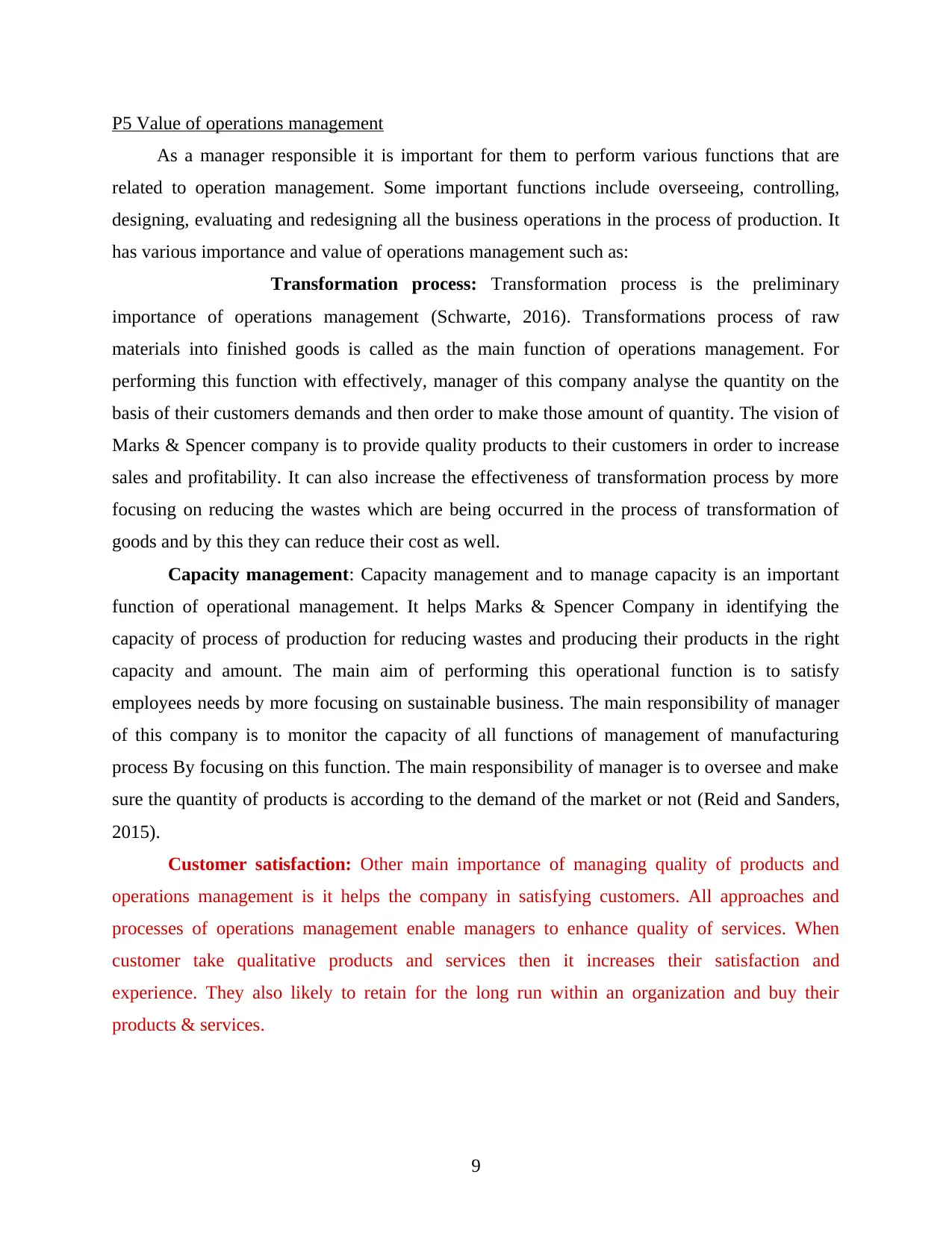
P5 Value of operations management
As a manager responsible it is important for them to perform various functions that are
related to operation management. Some important functions include overseeing, controlling,
designing, evaluating and redesigning all the business operations in the process of production. It
has various importance and value of operations management such as:
Transformation process: Transformation process is the preliminary
importance of operations management (Schwarte, 2016). Transformations process of raw
materials into finished goods is called as the main function of operations management. For
performing this function with effectively, manager of this company analyse the quantity on the
basis of their customers demands and then order to make those amount of quantity. The vision of
Marks & Spencer company is to provide quality products to their customers in order to increase
sales and profitability. It can also increase the effectiveness of transformation process by more
focusing on reducing the wastes which are being occurred in the process of transformation of
goods and by this they can reduce their cost as well.
Capacity management: Capacity management and to manage capacity is an important
function of operational management. It helps Marks & Spencer Company in identifying the
capacity of process of production for reducing wastes and producing their products in the right
capacity and amount. The main aim of performing this operational function is to satisfy
employees needs by more focusing on sustainable business. The main responsibility of manager
of this company is to monitor the capacity of all functions of management of manufacturing
process By focusing on this function. The main responsibility of manager is to oversee and make
sure the quantity of products is according to the demand of the market or not (Reid and Sanders,
2015).
Customer satisfaction: Other main importance of managing quality of products and
operations management is it helps the company in satisfying customers. All approaches and
processes of operations management enable managers to enhance quality of services. When
customer take qualitative products and services then it increases their satisfaction and
experience. They also likely to retain for the long run within an organization and buy their
products & services.
9
As a manager responsible it is important for them to perform various functions that are
related to operation management. Some important functions include overseeing, controlling,
designing, evaluating and redesigning all the business operations in the process of production. It
has various importance and value of operations management such as:
Transformation process: Transformation process is the preliminary
importance of operations management (Schwarte, 2016). Transformations process of raw
materials into finished goods is called as the main function of operations management. For
performing this function with effectively, manager of this company analyse the quantity on the
basis of their customers demands and then order to make those amount of quantity. The vision of
Marks & Spencer company is to provide quality products to their customers in order to increase
sales and profitability. It can also increase the effectiveness of transformation process by more
focusing on reducing the wastes which are being occurred in the process of transformation of
goods and by this they can reduce their cost as well.
Capacity management: Capacity management and to manage capacity is an important
function of operational management. It helps Marks & Spencer Company in identifying the
capacity of process of production for reducing wastes and producing their products in the right
capacity and amount. The main aim of performing this operational function is to satisfy
employees needs by more focusing on sustainable business. The main responsibility of manager
of this company is to monitor the capacity of all functions of management of manufacturing
process By focusing on this function. The main responsibility of manager is to oversee and make
sure the quantity of products is according to the demand of the market or not (Reid and Sanders,
2015).
Customer satisfaction: Other main importance of managing quality of products and
operations management is it helps the company in satisfying customers. All approaches and
processes of operations management enable managers to enhance quality of services. When
customer take qualitative products and services then it increases their satisfaction and
experience. They also likely to retain for the long run within an organization and buy their
products & services.
9
⊘ This is a preview!⊘
Do you want full access?
Subscribe today to unlock all pages.

Trusted by 1+ million students worldwide
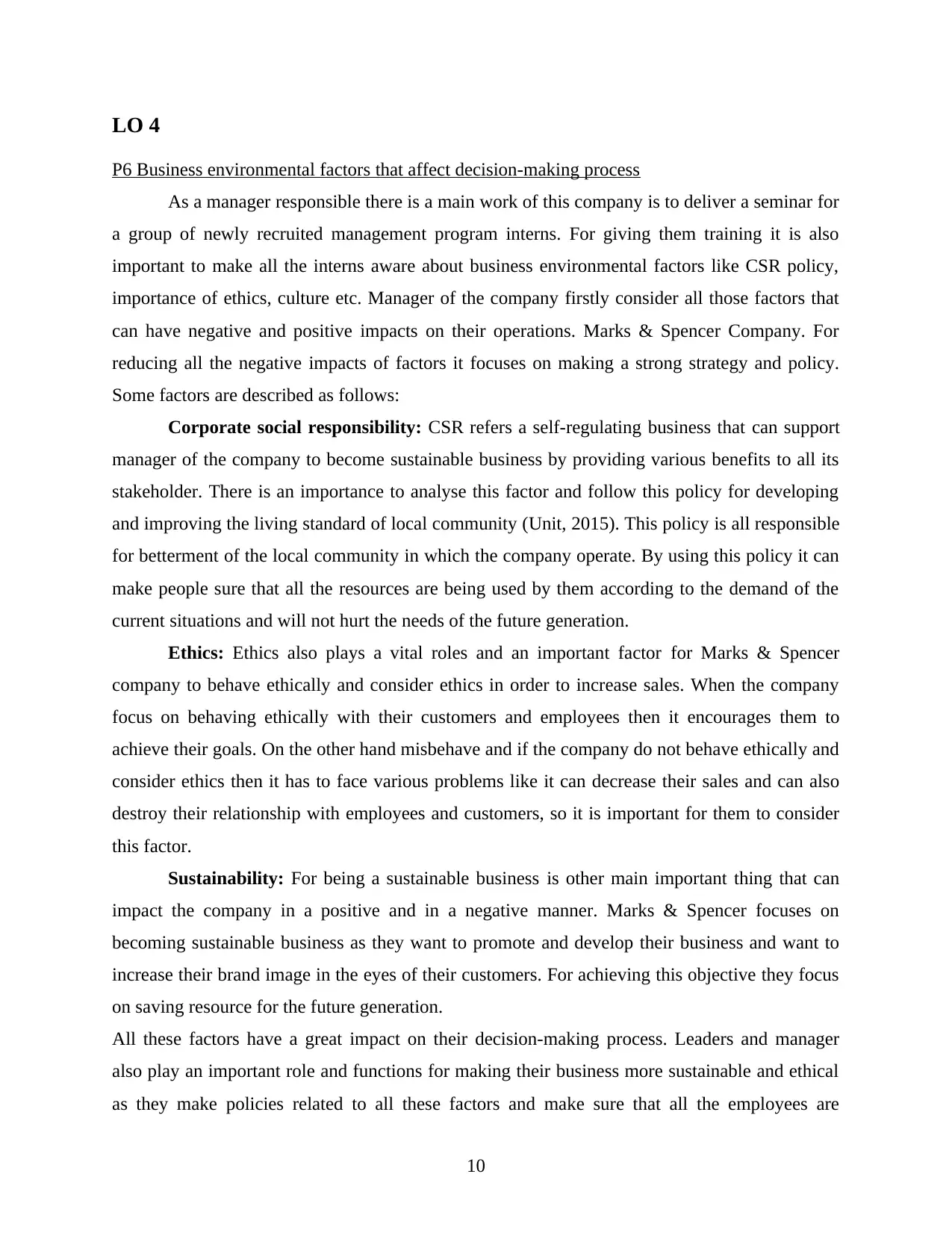
LO 4
P6 Business environmental factors that affect decision-making process
As a manager responsible there is a main work of this company is to deliver a seminar for
a group of newly recruited management program interns. For giving them training it is also
important to make all the interns aware about business environmental factors like CSR policy,
importance of ethics, culture etc. Manager of the company firstly consider all those factors that
can have negative and positive impacts on their operations. Marks & Spencer Company. For
reducing all the negative impacts of factors it focuses on making a strong strategy and policy.
Some factors are described as follows:
Corporate social responsibility: CSR refers a self-regulating business that can support
manager of the company to become sustainable business by providing various benefits to all its
stakeholder. There is an importance to analyse this factor and follow this policy for developing
and improving the living standard of local community (Unit, 2015). This policy is all responsible
for betterment of the local community in which the company operate. By using this policy it can
make people sure that all the resources are being used by them according to the demand of the
current situations and will not hurt the needs of the future generation.
Ethics: Ethics also plays a vital roles and an important factor for Marks & Spencer
company to behave ethically and consider ethics in order to increase sales. When the company
focus on behaving ethically with their customers and employees then it encourages them to
achieve their goals. On the other hand misbehave and if the company do not behave ethically and
consider ethics then it has to face various problems like it can decrease their sales and can also
destroy their relationship with employees and customers, so it is important for them to consider
this factor.
Sustainability: For being a sustainable business is other main important thing that can
impact the company in a positive and in a negative manner. Marks & Spencer focuses on
becoming sustainable business as they want to promote and develop their business and want to
increase their brand image in the eyes of their customers. For achieving this objective they focus
on saving resource for the future generation.
All these factors have a great impact on their decision-making process. Leaders and manager
also play an important role and functions for making their business more sustainable and ethical
as they make policies related to all these factors and make sure that all the employees are
10
P6 Business environmental factors that affect decision-making process
As a manager responsible there is a main work of this company is to deliver a seminar for
a group of newly recruited management program interns. For giving them training it is also
important to make all the interns aware about business environmental factors like CSR policy,
importance of ethics, culture etc. Manager of the company firstly consider all those factors that
can have negative and positive impacts on their operations. Marks & Spencer Company. For
reducing all the negative impacts of factors it focuses on making a strong strategy and policy.
Some factors are described as follows:
Corporate social responsibility: CSR refers a self-regulating business that can support
manager of the company to become sustainable business by providing various benefits to all its
stakeholder. There is an importance to analyse this factor and follow this policy for developing
and improving the living standard of local community (Unit, 2015). This policy is all responsible
for betterment of the local community in which the company operate. By using this policy it can
make people sure that all the resources are being used by them according to the demand of the
current situations and will not hurt the needs of the future generation.
Ethics: Ethics also plays a vital roles and an important factor for Marks & Spencer
company to behave ethically and consider ethics in order to increase sales. When the company
focus on behaving ethically with their customers and employees then it encourages them to
achieve their goals. On the other hand misbehave and if the company do not behave ethically and
consider ethics then it has to face various problems like it can decrease their sales and can also
destroy their relationship with employees and customers, so it is important for them to consider
this factor.
Sustainability: For being a sustainable business is other main important thing that can
impact the company in a positive and in a negative manner. Marks & Spencer focuses on
becoming sustainable business as they want to promote and develop their business and want to
increase their brand image in the eyes of their customers. For achieving this objective they focus
on saving resource for the future generation.
All these factors have a great impact on their decision-making process. Leaders and manager
also play an important role and functions for making their business more sustainable and ethical
as they make policies related to all these factors and make sure that all the employees are
10
Paraphrase This Document
Need a fresh take? Get an instant paraphrase of this document with our AI Paraphraser
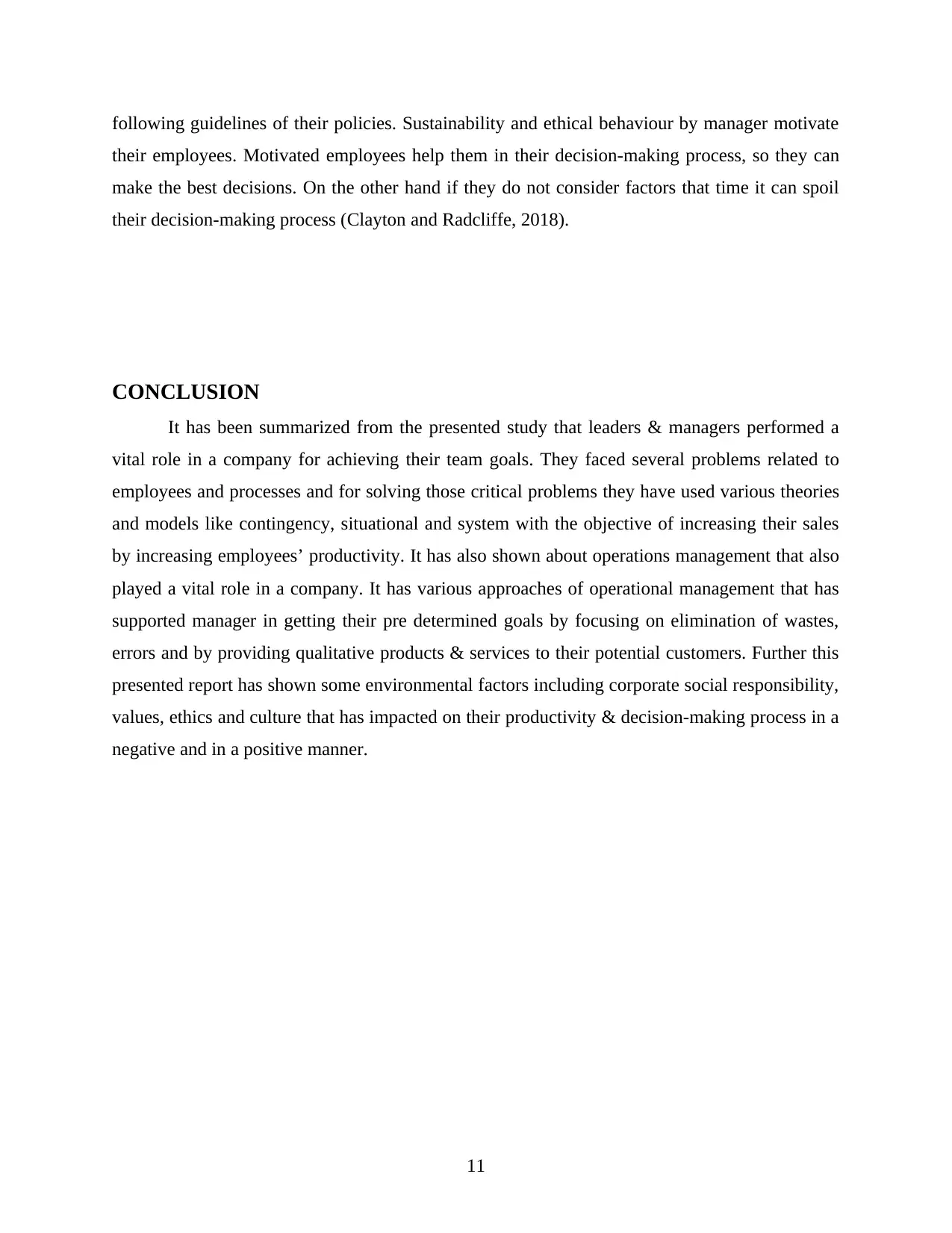
following guidelines of their policies. Sustainability and ethical behaviour by manager motivate
their employees. Motivated employees help them in their decision-making process, so they can
make the best decisions. On the other hand if they do not consider factors that time it can spoil
their decision-making process (Clayton and Radcliffe, 2018).
CONCLUSION
It has been summarized from the presented study that leaders & managers performed a
vital role in a company for achieving their team goals. They faced several problems related to
employees and processes and for solving those critical problems they have used various theories
and models like contingency, situational and system with the objective of increasing their sales
by increasing employees’ productivity. It has also shown about operations management that also
played a vital role in a company. It has various approaches of operational management that has
supported manager in getting their pre determined goals by focusing on elimination of wastes,
errors and by providing qualitative products & services to their potential customers. Further this
presented report has shown some environmental factors including corporate social responsibility,
values, ethics and culture that has impacted on their productivity & decision-making process in a
negative and in a positive manner.
11
their employees. Motivated employees help them in their decision-making process, so they can
make the best decisions. On the other hand if they do not consider factors that time it can spoil
their decision-making process (Clayton and Radcliffe, 2018).
CONCLUSION
It has been summarized from the presented study that leaders & managers performed a
vital role in a company for achieving their team goals. They faced several problems related to
employees and processes and for solving those critical problems they have used various theories
and models like contingency, situational and system with the objective of increasing their sales
by increasing employees’ productivity. It has also shown about operations management that also
played a vital role in a company. It has various approaches of operational management that has
supported manager in getting their pre determined goals by focusing on elimination of wastes,
errors and by providing qualitative products & services to their potential customers. Further this
presented report has shown some environmental factors including corporate social responsibility,
values, ethics and culture that has impacted on their productivity & decision-making process in a
negative and in a positive manner.
11
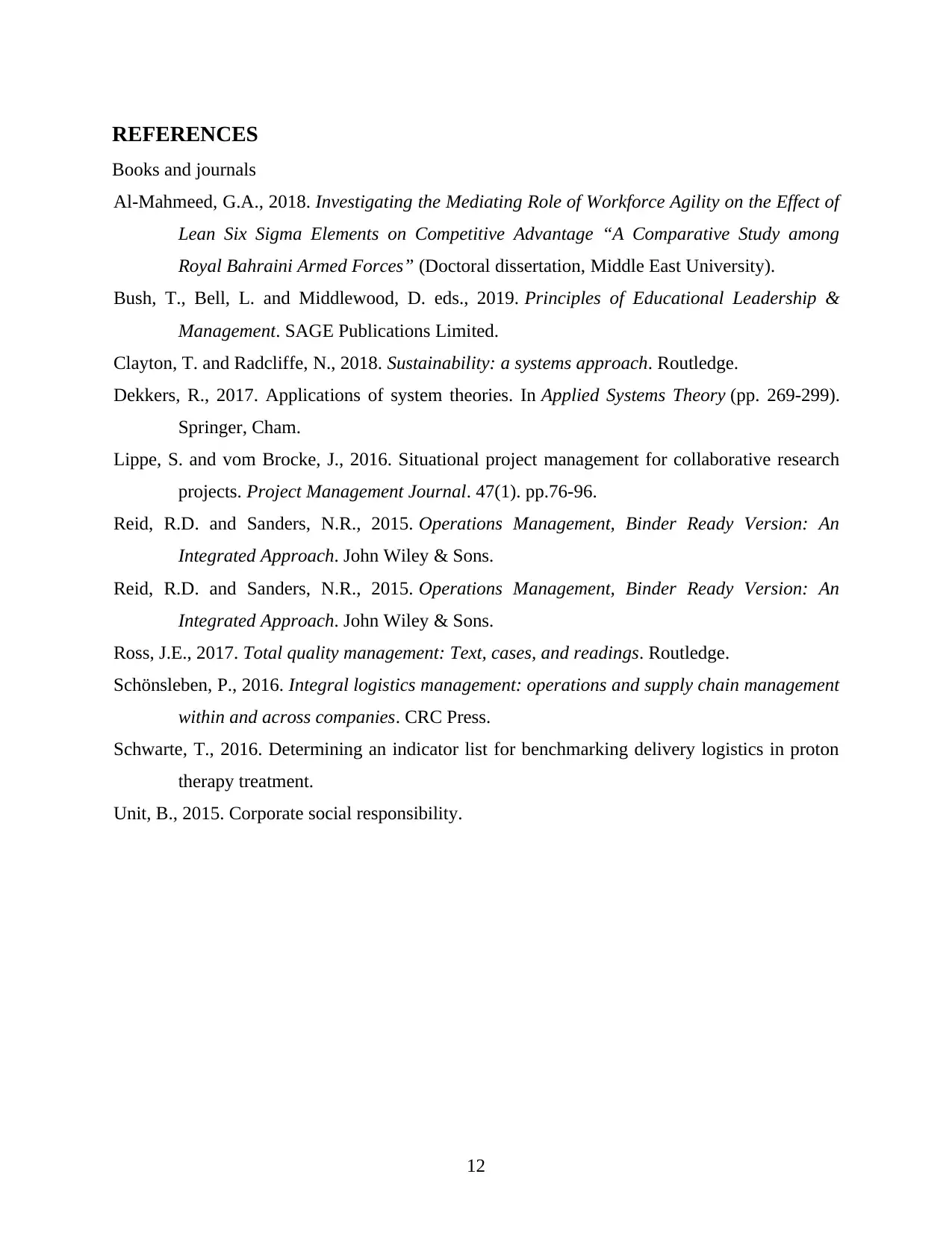
REFERENCES
Books and journals
Al-Mahmeed, G.A., 2018. Investigating the Mediating Role of Workforce Agility on the Effect of
Lean Six Sigma Elements on Competitive Advantage “A Comparative Study among
Royal Bahraini Armed Forces” (Doctoral dissertation, Middle East University).
Bush, T., Bell, L. and Middlewood, D. eds., 2019. Principles of Educational Leadership &
Management. SAGE Publications Limited.
Clayton, T. and Radcliffe, N., 2018. Sustainability: a systems approach. Routledge.
Dekkers, R., 2017. Applications of system theories. In Applied Systems Theory (pp. 269-299).
Springer, Cham.
Lippe, S. and vom Brocke, J., 2016. Situational project management for collaborative research
projects. Project Management Journal. 47(1). pp.76-96.
Reid, R.D. and Sanders, N.R., 2015. Operations Management, Binder Ready Version: An
Integrated Approach. John Wiley & Sons.
Reid, R.D. and Sanders, N.R., 2015. Operations Management, Binder Ready Version: An
Integrated Approach. John Wiley & Sons.
Ross, J.E., 2017. Total quality management: Text, cases, and readings. Routledge.
Schönsleben, P., 2016. Integral logistics management: operations and supply chain management
within and across companies. CRC Press.
Schwarte, T., 2016. Determining an indicator list for benchmarking delivery logistics in proton
therapy treatment.
Unit, B., 2015. Corporate social responsibility.
12
Books and journals
Al-Mahmeed, G.A., 2018. Investigating the Mediating Role of Workforce Agility on the Effect of
Lean Six Sigma Elements on Competitive Advantage “A Comparative Study among
Royal Bahraini Armed Forces” (Doctoral dissertation, Middle East University).
Bush, T., Bell, L. and Middlewood, D. eds., 2019. Principles of Educational Leadership &
Management. SAGE Publications Limited.
Clayton, T. and Radcliffe, N., 2018. Sustainability: a systems approach. Routledge.
Dekkers, R., 2017. Applications of system theories. In Applied Systems Theory (pp. 269-299).
Springer, Cham.
Lippe, S. and vom Brocke, J., 2016. Situational project management for collaborative research
projects. Project Management Journal. 47(1). pp.76-96.
Reid, R.D. and Sanders, N.R., 2015. Operations Management, Binder Ready Version: An
Integrated Approach. John Wiley & Sons.
Reid, R.D. and Sanders, N.R., 2015. Operations Management, Binder Ready Version: An
Integrated Approach. John Wiley & Sons.
Ross, J.E., 2017. Total quality management: Text, cases, and readings. Routledge.
Schönsleben, P., 2016. Integral logistics management: operations and supply chain management
within and across companies. CRC Press.
Schwarte, T., 2016. Determining an indicator list for benchmarking delivery logistics in proton
therapy treatment.
Unit, B., 2015. Corporate social responsibility.
12
⊘ This is a preview!⊘
Do you want full access?
Subscribe today to unlock all pages.

Trusted by 1+ million students worldwide
1 out of 12
Related Documents
Your All-in-One AI-Powered Toolkit for Academic Success.
+13062052269
info@desklib.com
Available 24*7 on WhatsApp / Email
![[object Object]](/_next/static/media/star-bottom.7253800d.svg)
Unlock your academic potential
Copyright © 2020–2025 A2Z Services. All Rights Reserved. Developed and managed by ZUCOL.





